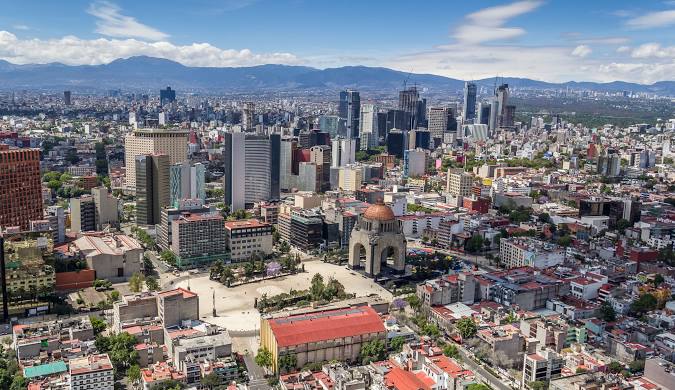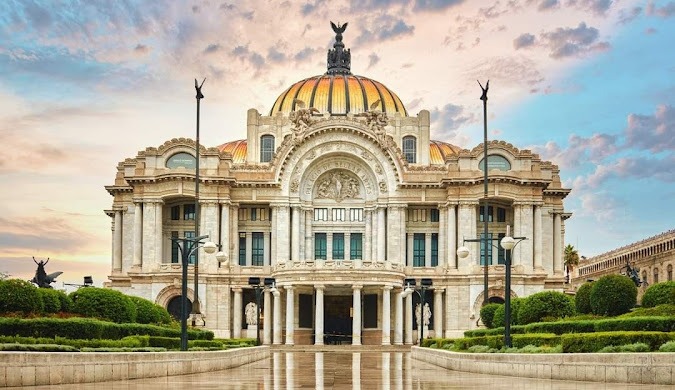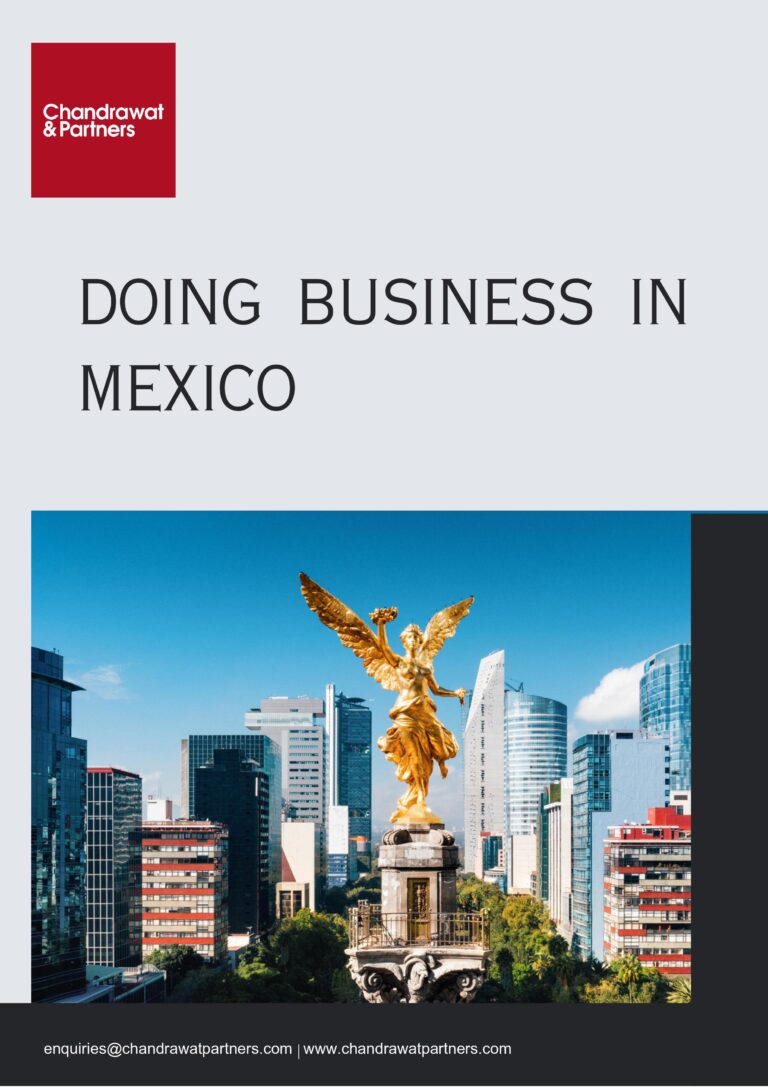We have a team of professionals to help you with all your business needs. So, that you can focus on business expansion in Mexico.
Please feel free to email us on [email protected]
Mexico
Why Mexico?
Situated in the southern portion of North America, Mexico is officially known as the United Mexican States. Being the world’s 13th-largest country by area; with approximately 126,014,024 inhabitants, it is the 10th-most-populous country and has the most Spanish-speakers. Mexico is organized as a federation comprising of 31 states and Mexico City is its capital. The capital is not only a primate city with a population of approximately 21 million, but also one of the world’s largest cities. Mexico is a developing country ranking 74th on the Human Development Index also has the world’s 15th-largest economy by nominal GDP and the 11th-largest by PPP, with the United States being its largest economic partner. The country is also a member of United Nations, the G20, the Organisation for Economic Co-operation and Development (OECD), the World Trade Organization (WTO), the Asia-Pacific Economic Cooperation forum, the Organization of American States, Community of Latin American and Caribbean States and the Organization of Ibero-American States.
Advantages
The country is one of the top global exporters of manufactured goods and is a major exporter to the United States. Over the next five years, Mexico’s position in the global market is forecasted to grow to be one of the top 20 countries to drive the global economy.
Open to foreign direct investment
The Mexican government is supportive and encouraging of foreign direct investment. Investors are attracted to the region due to its macroeconomic stability, fast-growing customer base and increasingly skilled labor market.
Strong trade agreements
Mexico has trade agreements with 45 countries, providing investors with access to over 50% of GDP worldwide. U.S.–Mexico–Canada Agreement, which will replace for NAFTA, is expected to be ratified by all parties. Mexico has a variety of other trade agreements in place, including the Comprehensive and Progressive Agreement for Trans-Pacific Partnership, the EU–Mexico Trade Agreement, the EFTA Free Trade Agreement and the Pacific Alliance agreement.
Diversified economy
Mexico has a diverse economy that includes agriculture, industrial and the services industry. This diversification helps to create stability for investors. The country is currently the world’s 11th largest exporter due to its strong production capacity. Mexico recently started expanding beyond raw material production, such as oil — focusing instead on manufacturing products that integrate to regional and global value chains.
Infrastructure
The Mexican government has invested heavily in infrastructure, which includes a network of railway and highway systems covering the entire country. The government is making additional investments to develop stronger infrastructure closer to the north and near the United States border.
Growing domestic market
Mexico has over 120 million consumers and a growing middle class with disposable income. The standard of living has risen steadily since the 1994 NAFTA agreement. The county’s middle class has risen to include roughly 47% of the country’s population.
Simple Tax Regime
Individual Tax
In Mexico, resident individuals are subject to Mexican income tax on their worldwide income, regardless of their nationality. Non-residents, including Mexican citizens who can prove residence for tax purposes in a foreign country, are taxed only on their Mexican-source income.
Personal income tax rates
The following tax rates are effective for resident individuals for calendar year 2022:
- Income from 0.01 Mexican Peso equals (MXN) to 7,735.00 MXN is liable to tax at a rate of 1.92%; Income from 7,735.01 MXN to 65,651.07 MXN is liable to tax at a rate of 6.40%;
- Income from 65,651.08 MXN to 115,375.90 MXN is liable to tax at a rate of 10.88%;
- Income from 115,375.91 MXN to 134,119.41 MXN is liable to tax at a rate of 16.00%;
- Income from 134,119.42 MXN to 160,577.65 MXN is liable to tax at a rate of 17.92%;
- Income from 160,577.66 MXN to 323,862.00 MXN is liable to tax at a rate of 21.36%;
- Income from 323,862.01 MXN to 510,451.00 MXN is liable to tax at a rate of 23.52%;
- Income from 510,451.01 MXN to 974,535.03 MXN is liable to tax at a rate of 30.00%;
- Income from 974,535.04 MXN to 1,299,380.04 MXN is liable to tax at a rate of 32.00%;
- Income from 1,299,380.05 MXN to 3,898,140.12 MXN is liable to tax at a rate of 34.00%;
- Income from 3,898,140.13 MXN and above is liable to tax at a rate of 35.00%.
If the employee is considered a non-resident for Mexican tax purposes, the tax rate applicable to compensation will vary from 15% to 30%. The first MXN 125,900 of employment income received in a 12-month floating period will be tax exempt.
Corporate Tax
Federal corporate income tax (CIT)
CIT applies to Mexican resident taxpayers’ income from worldwide sources, as well as to foreign residents from income derived from Mexican-source wealth and on the income attributed to their permanent establishments (PEs) located in Mexico.
The federal CIT rate is 30%.
All corporate entities, including associations of a civil nature, branches, etc., are subject to the tax rules applicable to Mexican corporations (unless specifically ruled out, such as not-for-profit organisations).
Corporate taxpayers engaged exclusively in agriculture, livestock, fishing, and forestry activities are subject to a reduction of 30% of their tax liability.
Local income tax
There are no state taxes on corporate net income.
Mexican Companies
The most forthright way of capitalizing the opportunities is to incorporate a company in Mexico directly into the local market. But first, you need to know the most prevalent types of legal entities you can form in this nation. Following types of companies are available in Mexico:
Stock Corporation (Sociedad Anónima de Capital Variable)
[8:03 PM, 8/26/2022] Tiya C&P: When a person forms a stock company, its ‘value’ is divided into shares. Typically, the creditors protect these shares. Stock Corporations have no restrictions on the number of shareholders who can invest in the company. This means that a person can easily raise the necessary capital even if his company is relatively new. This structure has the largest possibility for growth and profit, despite its bureaucratic and administrative burdens.
[8:23 PM, 8/26/2022] Tiya C&P: 1st August-5th August- All changes updated on the website. Checked and corrected.
Limited Liability Company (Sociedad de Responsabilidad Limitada de Capital Variable)
Limited Liability Companies (LLC) fall behind Stock Corporations in terms of popularity. Like the SC, each LLC base its value on shares. Other distinguishing features include the following:
- An LLC is very practical for small and medium enterprises.
- The initial deposit to form the company is just MXN$3,000 or approximately USD$160. Members of the LLC pay their individual share of taxes through tax returns, instead of paying as a collective company.
- Every members’ assets have guaranteed protection. This means they are only accountable for their own shares in the company.
Simplified Shares Company (Sociedad por Acciones Simplificada)
Another major company structure is the Simplified Shares Company. It is a fairly new concept that gained a reputation in 2016 as part of the reformed General Law of Commercial Companies. Mexico is taking momentous steps to open up its market for foreign investment. To make this happen, the government has modified the commercial legislation to streamline and encourage foreign operations.
Some key characteristics of the Mexican Simplified Shares Company include.
- The formation process for this company is cheaper and faster than SC and LLC.
- It has a simple corporate structure, ideal for SMEs looking for an easy client-provider route.
The three mentioned above are the most usual company types you can find. However, it is worth noting that there are two more groups such as:
- Stock Corporation for Investment Promotion (Sociedad Anónima Promotora de Inversión)
- Multi-Purpose Financial Company (Sociedad Financiera de Objeto Múltiple)
These two corporate forms emphasize on companies entering the Mexican Stock Exchange (Bolsa Mexicana de Valores or the BMV).
The capital is not only a primate city having a population of approximately 21 million, but also one of the world’s largest cities. Mexico is a developing country, ranking 74th on the Human Development Index and it also has the world’s 15th-largest economy by nominal GDP and the 11th-largest by PPP, with the United States being its largest economic partner.
Author: Chandrawat & Partners
Topic: About Mexico
Contact Us
Get in touch with the right people to get the right help in setting up your business in Mexico.
Contact us at: [email protected]
Mexico
We have a team of professionals to help you with all your business needs. So, that you can focus on business expansion in Mexico.
WHY MEXICO?
Situated in the southern portion of North America, Mexico is officially known as the United Mexican States. Being the world’s 13th-largest country by area; with approximately 126,014,024 inhabitants, it is the 10th-most-populous country and has the most Spanish-speakers. Mexico is organized as a federation comprising of 31 states and Mexico City is its capital. The capital is not only a primate city with a population of approximately 21 million, but also one of the world’s largest cities. Mexico is a developing country ranking 74th on the Human Development Index also has the world’s 15th-largest economy by nominal GDP and the 11th-largest by PPP, with the United States being its largest economic partner.
The country is also a member of United Nations, the G20, the Organisation for Economic Co-operation and Development (OECD), the World Trade Organization (WTO), the Asia-Pacific Economic Cooperation forum, the Organization of American States, Community of Latin American and Caribbean States and the Organization of Ibero-American States.

ADVANTAGES
Open to foreign direct investment
The Mexican government is supportive and encouraging of foreign direct investment. Investors are attracted to the region due to its macroeconomic stability, fast-growing customer base and increasingly skilled labor market.
Strong trade agreements
Mexico has trade agreements with 45 countries, providing investors with access to over 50% of GDP worldwide. U.S.–Mexico–Canada Agreement, which will replace for NAFTA, is expected to be ratified by all parties. Mexico has a variety of other trade agreements in place, including the Comprehensive and Progressive Agreement for Trans-Pacific Partnership, the EU–Mexico Trade Agreement, the EFTA Free Trade Agreement and the Pacific Alliance agreement.
Diversified economy
Mexico has a diverse economy that includes agriculture, industrial and the services industry. This diversification helps to create stability for investors. The country is currently the world’s 11th largest exporter due to its strong production capacity. Mexico recently started expanding beyond raw material production, such as oil — focusing instead on manufacturing products that integrate to regional and global value chains.
Infrastructure
The Mexican government has invested heavily in infrastructure, which includes a network of railway and highway systems covering the entire country. The government is making additional investments to develop stronger infrastructure closer to the north and near the United States border.
Growing domestic market
Mexico has over 120 million consumers and a growing middle class with disposable income. The standard of living has risen steadily since the 1994 NAFTA agreement. The county’s middle class has risen to include roughly 47% of the country’s population.
SIMPLE TAX REGIME
Individual Tax
In Mexico, resident individuals are subject to Mexican income tax on their worldwide income, regardless of their nationality. Non-residents, including Mexican citizens who can prove residence for tax purposes in a foreign country, are taxed only on their Mexican-source income

Personal Income Tax
The following tax rates are effective for resident individuals for calendar year 2022:
- Income from 0.01 Mexican Peso equals (MXN) to 7,735.00 MXN is liable to tax at a rate of 1.92%; Income from 7,735.01 MXN to 65,651.07 MXN is liable to tax at a rate of 6.40%;
- Income from 65,651.08 MXN to 115,375.90 MXN is liable to tax at a rate of 10.88%;
- Income from 115,375.91 MXN to 134,119.41 MXN is liable to tax at a rate of 16.00%;
- Income from 134,119.42 MXN to 160,577.65 MXN is liable to tax at a rate of 17.92%;
- Income from 160,577.66 MXN to 323,862.00 MXN is liable to tax at a rate of 21.36%;
- Income from 323,862.01 MXN to 510,451.00 MXN is liable to tax at a rate of 23.52%;
- Income from 510,451.01 MXN to 974,535.03 MXN is liable to tax at a rate of 30.00%;
- Income from 974,535.04 MXN to 1,299,380.04 MXN is liable to tax at a rate of 32.00%;
- Income from 1,299,380.05 MXN to 3,898,140.12 MXN is liable to tax at a rate of 34.00%;
- Income from 3,898,140.13 MXN and above is liable to tax at a rate of 35.00%.
If the employee is considered a non-resident for Mexican tax purposes, the tax rate applicable to compensation will vary from 15% to 30%. The first MXN 125,900 of employment income received in a 12-month floating period will be tax exempt.
Corporate Tax
Federal corporate income tax (CIT)
CIT applies to Mexican resident taxpayers’ income from worldwide sources, as well as to foreign residents from income derived from Mexican-source wealth and on the income attributed to their permanent establishments (PEs) located in Mexico. The federal CIT rate is 30%. All corporate entities, including associations of a civil nature, branches, etc., are subject to the tax rules applicable to Mexican corporations (unless specifically ruled out, such as not-for-profit organisations). Corporate taxpayers engaged exclusively in agriculture, livestock, fishing, and forestry activities are subject to a reduction of 30% of their tax liability.
Local income tax
There are no state taxes on corporate net income.
MEXICAN COMPANIES
The most forthright way of capitalizing the opportunities is to incorporate a company in Mexico directly into the local market. But first, you need to know the most prevalent types of legal entities you can form in this nation. Following types of companies are available in Mexico:
Stock Corporation (Sociedad Anónima de Capital Variable)
Tiya C&P: When a person forms a stock company, its ‘value’ is divided into shares. Typically, the creditors protect these shares. Stock Corporations have no restrictions on the number of shareholders who can invest in the company. This means that a person can easily raise the necessary capital even if his company is relatively new. This structure has the largest possibility for growth and profit, despite its bureaucratic and administrative burdens.
Tiya C&P: 1st August-5th August- All changes updated on the website. Checked and corrected.

Limited Liability Company (Sociedad de Responsabilidad Limitada de Capital Variable)
Limited Liability Companies (LLC) fall behind Stock Corporations in terms of popularity. Like the SC, each LLC base its value on shares. Other distinguishing features include the following:
- An LLC is very practical for small and medium enterprises.
- The initial deposit to form the company is just MXN$3,000 or approximately USD$160. Members of the LLC pay their individual share of taxes through tax returns, instead of paying as a collective company.
- Every members’ assets have guaranteed protection. This means they are only accountable for their own shares in the company.

Simplified Shares Company (Sociedad por Acciones Simplificada)
Another major company structure is the Simplified Shares Company. It is a fairly new concept that gained a reputation in 2016 as part of the reformed General Law of Commercial Companies. Mexico is taking momentous steps to open up its market for foreign investment. To make this happen, the government has modified the commercial legislation to streamline and encourage foreign operations.
Some key characteristics of the Mexican Simplified Shares Company include.
- The formation process for this company is cheaper and faster than SC and LLC.
- It has a simple corporate structure, ideal for SMEs looking for an easy client-provider route.
- Stock Corporation for Investment Promotion (Sociedad Anónima Promotora de Inversión)
- Multi-Purpose Financial Company (Sociedad Financiera de Objeto Múltiple)




